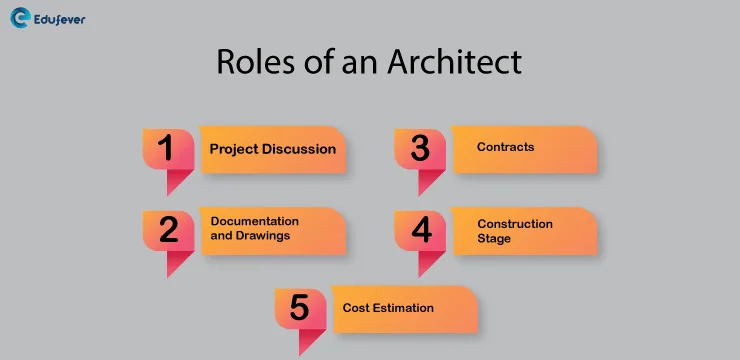Career in Architecture in India: Do you know that the Burj Khalifa, the tallest building in the world, was built and designed by a team of Architect. Architects are the original creators of amazing buildings and constructions. Skyscrapers in metro cities and around the world will not be possible without them. If we talk about the growth and increase of the human race to tall buildings with beautiful designs and glory, it shows the art and creativity of an architect.
Architecture is seen as a prestigious profession, but there have been remarkable changes recently. Students from diverse backgrounds and disciplines are enrolling in architecture colleges in India. A career in architecture offers an appealing salary and significant growth potential. Along with meeting the necessary criteria, specific skills are essential for success in this field.
[Index]
Courses in Architecture
For people who want to study and build a career in Architecture, there are various courses available in India. Below we have mentioned some of the courses offered in India at the undergraduate and postgraduation levels.
Bachelor’s Degree in Architecture
Here is the list of Bachelor’s degree courses for Architecture:
| B.Arch (Bachelor of Architecture) | Bachelor of Construction Technology |
| B.Arch. (Architecture and Regional Planning) | B.Tech. (Urban & Regional Planning) |
| B.Arch. (Building and Construction Management) | B.Sc. (Residential Space Design and Management) |
| B.Arch. (Interior Design) | B.Plan |
| B.Arch. (Landscape Architecture) | B.E. (Construction Technology) |
Master’s Degree Courses in Architecture
The following are the master’s degree courses in architecture:
| Executive Master of Architecture Advanced Design | M.Arch. (Master of Architecture) |
| M.Arch. (Advanced Design) | M.Arch. (Architectural and Settlement Conservation) |
| M.Arch. (Architectural Conservation) | M.Arch. (Architectural Design) |
| M.Arch. (Building Construction and Management) | M.Arch. (Computer Applications) |
| M.Arch. (Construction Management) | M.Arch. (Digital Architecture) |
| M.Arch. (Environmental Architecture) | M.Arch. (Industrial Design) |
| M.Arch. (Interior Design) | M.Arch. (Landscape Architecture) |
| M.Arch. (Theory & Design) | M.Arch. (Urban Design) |
| M.E. (Housing) | M.E. (Landscape Architecture) |
| M.E. (Urban Design) | M.Arch. (Architectural and Settlement Conservation) |
| M.Sc. (Urban and Regional Planning) | M.Tech. (Urban Planning) |
| Master of Building Engineering and Management | Master of Interior Architecture & Design |
| Master of Planning (Environmental Planning) | Master of Planning (Housing) |
| Master of Planning (Industrial Area Planning and Management) | Master of Planning (Infrastructure) |
| Master of Planning (Regional Planning) | Master of Planning (Rural Planning and Management) |
| Master of Planning (Transport Planning) | Master of Planning (Urban and Regional Planning) |
| Master of Planning (Urban Planning) | Masters in Planning |
PhD Courses in Architecture
In the below table, we have listed down the PhD courses in Architecture:
| PhD (Architectural Conservation) | PhD (Architecture) |
| PhD (Building Engineering and Management) | PhD (Environmental Planning) |
| PhD (Housing) | PhD (Industrial Design) |
| PhD (Landscape Architecture) | PhD (Physical Planning) |
| PhD (Regional Planning) | PhD (Transport Planning) |
| PhD (Urban Design) | PhD (Urban Planning) |
Diploma Courses in Architecture
The following are the diploma courses in architecture:
| Diploma in Architectural Assistantship | Diploma in Architecture Engineering |
| Diploma in Construction Management (DCM) | Diploma in Construction Technology (DCT) |
| Foundation Diploma in Architecture and Design (F.D.A.D.) | Post Graduate Diploma in Construction Management |
| Post Graduate Diploma in Town–Country Planning | – |
Admission Procedure
Candidates can pursue architecture courses by taking the NATA entrance exam and build a career in architecture. Each college or university has its admission criteria and processes. Additionally, admission may vary depending on the state or region, with different seat quotas allocated in each.
Eligibility Criteria
The candidate, who want to study and build a career in Architecture must enroll themselves on Architecture courses. In the below table we have mentioned eligibility criteria for Architecture courses:
| Particulars | Description |
|---|---|
| Qualification | 10+2 or equivalent with the compulsory maths subject with a minimum of 50% marks. 10th + 3 years diploma in any stream from a recognized university/ board/ institution. |
| Qualifying Exams | Clear NATA (National Aptitude Test in Architecture) with 80% marks conducted by the Council of Architecture |
Top NIRF Architecture Colleges in India
Selecting the right college is essential when pursuing any course. Below, we’ve listed the top architectural colleges in India according to NIRF. Let’s explore them.
| Name | City | State | Rank |
|---|---|---|---|
| Indian Institute of Technology, Roorkee | Roorkee | Uttarakhand | 5 |
| National Institute of Technology, Calicut | Kozhikode | Kerala | 23 |
| Indian Institute of Technology, Kharagpur | Kharagpur | West Bengal | 6 |
| National Institute of Technology, Tiruchirappalli | Tiruchirappalli | Tamil Nadu | 9 |
| Indian Institute of Engineering Science and Technology, Shibpur | Howrah | West Bengal | 35 |
| Visvesvaraya National Institute of Technology, Nagpur | Nagpur | Maharashtra | 41 |
| Jamia Millia Islamia, New Delhi | New Delhi | Delhi | 26 |
Career in Architecture
Career Opportunities in India are very bright as the government wants to build over 100 smart cities and many such new projects have been announced by the Indian government. Therefore, the course has 100% job security. With the rapid evolution of available technologies and their integration into the profession, the role of an architect is changing faster than ever.
There are immense opportunities for architects in the future as there will be a huge demand for new architects and building designers.
Job Profile
| Senior Principal Architect | Urban Planner |
| Senior Interior Designer | Principal Architect |
| Project Manager | Interior Architect |
| Design Architect | Landscape Architect |
Roles of an Architect
- Project Discussion: Whenever a client hires an architect to develop a detailed design based on their concept or idea. Meetings and discussions with various team members and engineering professionals take place to finalize the design. Topics covered include client requirements, budget, site features, safety, and local regulations.
- Documentation and Drawings: Architects are responsible for creating detailed drawings and testing the project’s feasibility.
- Cost Estimation: Estimating costs at various project stages enhances budget management. Architects bring creative designs and ideas to the construction industry, but they also require underlying structural designs and MEP installations to bring them to life.
- Contracts: Architects can help during the contract negotiation phase, and they may suggest and choose contractors for different activities. Once all tenders are received, the architect carries out analysis reports, and results are compared with the client’s expectations and budget.
- Construction Stage: Once construction begins, the architect will perform site visits and meetings, negotiate contracts, and deal with and resolve any possible problems. Some of the documentation during construction will require the architect’s signature and approval.

Skills of an Architect
- Analytical Skills
- Communication Skills
- Creativity
- Organisational Skills
- Technical Skills
- Visualization Skills

Average Salary
Here is the average salary for architects. Let’s take a look.
| Job Profiles | Average Salary |
|---|---|
| Project Architect | 8.5 LPA |
| Architecture Designer | 4.4 LPA |
| Interior Designer | 4.7 LPA |
| Assistant Professor | 6 LPA |
| Senior Project Architect | 10 LPA |
| Design Manager | 10 LPA |
Top Companies and Recruiters
Here are the top companies and recruiters for architects. Let’s take a look.
| Architect Hafeez Contractor | Gaursons India |
| Dar Al Handasah | C P Kukreja Associates |
| RSP Architects Ltd | Oscar & Ponni Architects |
| Arcop | Kembhavi Architecture Foundation |
| Shapoorji Pallonji & Co. Ltd. | Shilpa Architects |
| DLF | Christopher Charles Benninger Architects |
| Raj Rewal Associates | Somaya & Kalappa Consultants |
Frequently Asked Questions (FAQs)
Is Nata necessary for architecture?
NATA is a compulsory exam for admission to any Architectural College in India (Except NITs & IITs) and is an eligibility test for admission into the Architecture Course.
Which is better, Nata or JEE?
JEE Main is conducted by CBSE, whereas the Council of Architecture conducts NATA. The institutes that give admission based on JEE Main paper 2 are NITs and GFTIs, whereas, by NATA, you get admission into Private colleges and State level colleges other than NITs and IITs.
Is qualifying NATA easy?
It purely depends on your aptitude and drawing skills only. If you want to be a master in free-hand sketching/drawing, then only you can score high in NATA. Apart from this, NATA is an easy one.
